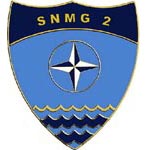Three NATO ships in the area, but without specific criminal rules
 Finally, it will not be seven ships - as announced at the start - but only three ships from NATO's Permanent Maritime Group, the SNMG2, which arrived in the area to fight against piracy. These are European ships - Greek, British and Italian; the others in the group (Turkish, American, German) continue on their way to visit the ports as originally planned. Much less than announced at the start!
Finally, it will not be seven ships - as announced at the start - but only three ships from NATO's Permanent Maritime Group, the SNMG2, which arrived in the area to fight against piracy. These are European ships - Greek, British and Italian; the others in the group (Turkish, American, German) continue on their way to visit the ports as originally planned. Much less than announced at the start!
An operation with more than blurred contours
The question now is: in which area, for what and how, until when? And there, it's still pretty vague. In particular on the accompaniment of the boats of the world food program. Effectively, the dutch ship, already there, has just taken over from the Canadians, on behalf of the European Union. And the NATO officer I spoke to on the phone can't say whether the NATO ships will carry out this mission? When ? Or if it is planned that they assist the Dutch ship as reinforcements... As for the protection of merchant ships or anti-piracy ships. Here again. Fuzzy answer. In the name of "secret defence"... However, it would be useful for merchant ships to know in which zone NATO ships will be patrolling. Is it in the corridor defined in the Gulf of Aden - and partially secured by CTF 150 - or in other areas such as the Seychelles or off Somalia?
Unknown legal rules of engagement
If NATO affirms that these rules of engagement have been well defined, we know nothing on the other hand of the fate which would be reserved for the seized pirates. Again silence:it is the responsibility of each participating State". What common rules have been planned? Identical answer... Logic. NATO remains an intergovernmental organization, it must rely on each national rule to act. Thus, according to the information I have obtained, none of the three States concerned by their boats in the area has an extensive law allowing pirates to be judged, except in a few very specific cases.
On October 17, NATO proudly announced that it had decided to dedicate its SNMG2 to the fight against piracy, and that they had just crossed the Suez Canal. No sooner said than done. In fact, SNMG2 had already scheduled a visit to several ports as part of the Istanbul initiative. And taking advantage of his time in the region, he intended to show his vigilance on the issue of piracy - which is getting more and more media coverage. What could be more normal than to ask ships in the area for increased vigilance. This is the role of any warship in a dangerous area. According to the Montego Bay Convention, in fact, only warships (or ships affected by public services) have the right to fight against piracy.
This therefore confirms my previous analysis. NATO's operation is more akin to "media branding" than an operation in the fight against piracy. But we can also ask other questions: What is the effectiveness of launching a mission if we cannot arrest and bring to justice the alleged criminals? We are not going to reinvent a Guantanamo bis all the same? Does NATO's military operation have legal legitimacy? More generally, is there a democratic and legal driver behind NATO's operations? To be continued...
Update: NATO's Secretary General announced - Monday morning - during a press briefing with Javier Solana, that one of NATO's ships had "successfully" escorted a ship containing equipment for Amisom, the African Union peacekeeping mission in Somalia.

